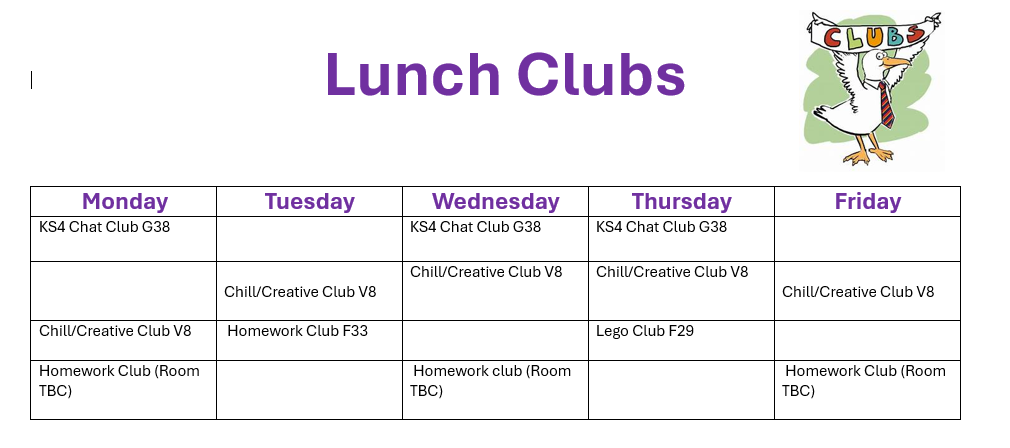- Home
- Curriculum
- Learning Support
Learning Support
Hello Everyone! We have designed this area as a place for you all where you can find resources and contacts to help you.
Do check in regularly for messages from the team, important news, updated information and any important dates that you and/or your parents/carers may need to make a note of.
We hope you find this page fun and informative. If you need to contact us please see our email addresses below.
The Learning Support Team
reeves.k@aylesfordschool.org.ukgould.m@aylesfordschool.org.uktillier.t@aylesfordschool.org.ukloveridge.d.b@aylesfordschool.co.uk
mcgreavy.d@aylesfordschool.org.uk
The SEND policies for the Primary and Secondary Phase can be found under 'Whole School Policies':
The timescale for the EHCP process can be found here:
Updates
Free Online Workshops
Click on the link below for some free workshops that are currently being offered to parents in Warwickshire - be sure to check back as new workshops come up and more dates come up too.
Warwickshire Children and Families Events
Free Online Course About Anxiety
Click on the link below for a free course (which lasts about an hour) that might be of use:
https://absolutemind.co.uk/free-anxiety-course/
Uncommon Clubs
Fun clubs and community for *neurodivergent teens - cost associated.

Spring Clubs start Jan 6th
*Autistic, ADHD, Dyslexic, Dyspraxic, SPD, PDA, Tourettes and all 'spicy' neurotypes welcome. No diagnosis required. Currently supporting 8-16 year olds
https://www.bemoreuncommon.com/clubs
SEND Inclusion Guidance
5 Helpful Revision Tips
1. Break down tasks into smaller chunks
Large tasks can seem daunting and overwhelming for all young people, particularly for autistic learners. Breaking down these large tasks into smaller chunks makes them much more manageable and digestible. For example, if a student needs to revise a particular topic in its entirety, when creating their revision timetable, they can break it down into sections, such as ‘read textbook’, 'create flashcards', ‘write model answer’ and ‘test yourself’. This allows the student to focus on one section at a time rather than feeling overwhelmed by the whole task. (Task Management board or "Now", "Next" or "Later")
2. Engage with visual aids
Visual aids are incredibly helpful when it comes to revising topics that require memorisation of facts or information. Autistic learners often find visual aids stimulating and engaging which helps them recall information more easily when studying or sitting exams. Examples of visual aids include diagrams, flowcharts and colour-coded flashcards.
3. Avoid multitasking
Multitasking is not an effective way of revising for any student but especially not for autistic learners, who require planned structure and routine in order to stay focused on one task at a time. Instead, each individual task should be completed one at a time with regular breaks in between so that the student does not become overwhelmed or distracted from the task at hand. A weekly revision timetable can also be overwhelming, so it's a good idea for an adult to present the daily tasks with clear breaks planned.
4. Utilise technology
Technology has revolutionised the way we learn today and autistic learners can benefit from using apps or websites specifically designed for revision purposes like Quizlet or Khan Academy, which provide interactive activities aimed at helping students engage with topics they are revising for their GCSEs. Another idea is to use 'Blooket' to gamify the flashcard revision process. Another site that I've used in the past is Get Revising.
5. Establish study habits early on
Autistic learners often thrive when given structure and routine so developing good study habits early on will ensure success during this period of revision as well as setting up positive habits going forward in life after their GCSEs have been taken care of! Encourage students to set realistic goals based on their availability; this could include having specific days dedicated completely to studying certain topics each week or employing situational strategies, such as revising English in the living room and maths in the kitchen - this works well for students to reduce overwhelm about recalling revision in exams. Also, schedule breaks and treats into the agreed timetable.

 |
Mrs Reeves - SEND Link
|
 |
Mr Tillier – SENCo
|
 |
Miss Loveridge-Dearne - SEND Assistant
|
 |
Mrs McGreavy - EAL Lead
|
 |
Mrs Kiernan
|
 |
Mrs Fryer
|
 |
Mrs Harrison
|
 |
Mrs S Davies
|
|
|
Mrs Miller
|
 |
Miss Loveridge
|
 |
Mr Flukes - neurodiversity lead
|
 |
Mr Jones
|
 |
Mrs Powers
|
| Other team members include: | Mr Ward, Mrs Yousaf, Mr Anderson, Miss Ubhi, Miss Wojtynowski-Gray |
What do we do?
-
We support students in a variety of lessons in school.
-
We ensure students have the tools and adaptations they need for learning in class.
-
We take individuals for 1:1 or small group interventions.
-
We support referrals to outside agencies.
-
We support the teaching staff with differentiation as we get to know the students.
-
We support with exam access which is informal in Years 7-9 and has to be formal and screened by an outside agency for GCSE (Year 10 and 11) and Sixth Form (Year 12 and 13)
-
We support the delivery of the Lexia reading programme.
-
We deliver a Functional Skills intervention group.
We do 1:1 mentoring.
-
We offer lunchtime clubs and social time support.
-
We support a peer mentoring programme where members of the sixth form buddy up with a student in KS3.
Lunch time clubs

Parent Support and Links
These websites may be of use as well as downloads below. Also please contact Mrs Reeves or Mr Tillier if we can be of assistance.
www.addiss.co.ukThe National Attention Deficit Disorder Information and Support Service.
They provide people-friendly information and resources about Attention Deficit Hyperactivity Disorder to anyone who needs assistance - parents, sufferers, teachers or health professionals.
www.autism.org.uk/directory.aspxThe National Autistic Society give useful advice to parents of autistic children, including an online directory which will pull together information according to your child’s age diagnosis and where they live.
https://autisticgirlsnetwork.org/Resources and help for girls with Autism.
https://www.bdadyslexia.org.uk/Contact, links and helps relating to dyslexia (which Warwickshire doesn't screen for).
www.cerebra.org.ukHelp to support parents/carers with children who have sleep issues. They also have a stress helpline.
combinedwellbeing.org.uk/This is an online guide for pupils, parents and professionals to support mental health and wellbeing.
https://www.covkidsot.co.ukOccupational Therapist Service with support links (Coventry based)
Children's Services Occupational TherapyOccupational Therapist Service in South Warwickshire
www.cwmind.org.ukMental health resources and charity.
www.cwrise.com/parent-and-carer-resourcesResources for ADHD support.
https://dimensions.covwarkpt.nhs.uk/Free online tool providing self-care information to support adults, children and young people in Coventry and Warwickshire
https://www.dyscalculianetwork.com/Resources, support and advice for dyscalculia.
www.dyslexiamidlands.comjustdyslexic.org.uk/Links for Dyslexic resources and help.
https://dyspraxiafoundation.org.ukOffers information and supports individuals and families affected by developmental dyspraxia through books, suggestions, a teen newsletter, and an adult support group.
www.equinelearning.org.ukPersonal development through horsemanship.
www.family-action.org.uk/wiasSENDIAS link for Warwickshire.
familylives.org.ukA national charity offering information support and advice about parenting including challenging behaviour , emotional wellbeing ,teenagers etc, details about specialist advice, parenting groups in your area.
https://www.internetmatters.org/connecting-safely-online/advice-for-young-people/first-steps/Resources for young people and parents/carers about social media.
www.kids.org.ukYoung Peoples Inclusion Network – YP -in provides online guidance about both strategy and putting Inclusion into Practice covering issues such as Leisure and Sports Services, Youth Provision, Transport and Independent Living.
www.livingwithadhd.co.ukAdvice for teenagers and parents relating to ADHD.
www.masteringmemory.co.ukBoosting working memory programs for children 2-11 or 11-adult.
www.minded.org.ukAre you a parent or carer who is concerned about the mental health of your child or teenager? Do you just want some hints and tips on parenting? MindEd for Families has advice and information from trusted experts and will help you to understand what problems occur, what you can do to best support your family, and how to take care of yourself. MindEd for Families is written by a team of specialists and parents, working together.
www.mylifemychoice.org.ukMy life my choice - helping people speak up and develop their skills
www.nhs.uk/conditionsFind information about ASD, SPLD and other medical conditions.
www.recoveryandwellbeing.co.ukAn educational approach to improve your emotional health and wellbeing, and is available to anyone living in Coventry and Warwickshire over the age of 18.
https://rosieweldon.com/Information and strategies for ASD girls who have reached puberty.
https://www.warwickshire.gov.uk/sendWarwickshire’s SEND local offer brings together information about the local services and support available across education, health and social care for families with children and young people aged 0 to 25, who have special educational needs and/or disabilities
www.talkingpoint.org.ukSpeech and Language Services – Talking Point provides a guide to speech and language services and useful links to other associated websites.
https://warwickshireparentcarervoice.org/Local forums for parents and carers of students with SEND.
www.youngminds.org.ukYoung Minds – a national charity committed to improving the mental health of all children, advice about depression, eating disorders, and other mental health issues affecting children, see website for details.



